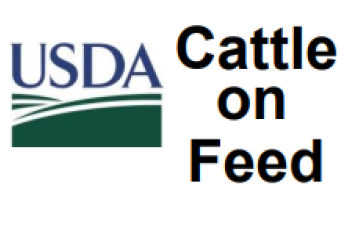First Thing Today | April 5, 2022

Good morning!
Strong followthrough buying overnight, led by wheat... Winter wheat futures led strong followthrough buying in the grain and soy markets overnight amid lower-than-expected U.S. crop ratings and global supply concerns. As of 6:30 a.m. CT, winter wheat futures are trading mostly 40-plus cents higher, spring wheat is 18 to 24 cents higher, corn is 5 to 7 cents higher and soybeans are 8 to 12 cents higher. Front-month U.S. crude oil futures are around 60 cents higher and the U.S. dollar index is modestly weaker.
Winter wheat CCI ratings plunge from last fall... When USDA’s initial crop condition ratings of the spring are plugged into the weighted Pro Farmer Crop Condition Index (0 to 500-point scale, with 500 being perfect), the HRW crop plunged 51.9 points from last fall to 272.6, while the SRW crop dropped 19.1 points to 342.2. The HRW CCI at the beginning of April is 57.3 points below the five-year average and the lowest since 2011. The SRW CCI rating is 14.4 points below the five-year average to start spring. Click here for details.
Russia/Ukraine update... The U.S. and Europe are planning new sanctions to punish Moscow over civilian killings in Ukraine. The EU’s next wave of punitive measures against Russia is likely to target the import and export of products like jet fuel, steel products and luxury goods, two sources with knowledge of the discussions told CNBC. The bloc remains divided, however, on whether to impose an import ban on Russian energy. President Joe Biden called Russian President Vladimir Putin a war criminal and urged a trial. The U.S. said it would push for Russia to be suspended from the U.N. Human Rights Council. Russia pushed back against Western claims its soldiers had committed war crimes in Ukraine, casting such allegations as fake propaganda staged by Ukrainian special forces to discredit Moscow. Russia said it would present to the U.N. Security Council “empirical evidence” of what it called lies by Ukraine and Western allies.
U.S. stops Russian bond payments in bid to increase pressure on Moscow... The U.S. stopped the Russian government on Monday from paying holders of its sovereign debt more than $600 million from reserves held at U.S. banks, in a move meant to ratchet pressure on Moscow and eat into its holdings of dollars. While foreign currency reserves held by the Russian central bank at U.S. financial institutions were frozen, the Treasury Department had been allowing the Russian government to use those funds to make coupon payments on dollar-denominated sovereign debt on a case-by-case basis. On Monday, the U.S. government decided to cut off Moscow's access to the frozen funds, according to a U.S. Treasury spokesperson. “Russia must choose between draining remaining valuable dollar reserves or new revenue coming in, or default,” the spokesperson said.
Ukraine grain group asks gov’t to lift wheat-export restrictions... The Ukrainian Grain Association, a group representing producers and exporters, is asking the nation’s government to scrap licensing restrictions on wheat exports to restore shipments, it said Tuesday. Ukraine has extra stockpiles of wheat due to a robust harvest last year. Maintaining shipments has been complex amid Russia’s invasion that has blocked the country’s seaports. Reports note that Ukraine’s government will likely consider removing the need for licenses from shippers to sell wheat abroad later this month after it has clarity on how the country’s spring planting is progressing.
War has big impact on Ukraine’s sunflower oil output: Kernel CEO... Closing of Ukrainian ports amid Russia’s war will have a huge impact on the country’s sunflower oil production and supplies worldwide, Ievgen Osypov, chief executive officer of Kernel Holding, said in an interview on Bloomberg TV. Local infrastructure is still currently in good condition but Ukraine’s planting area could fall 20% from last year, with yields also likely to decline. The country can only ship about 5% of its pre-war volumes, and it will take time to build a new logistics chain through the western border. Kernel is the world’s leading sunflower oil producer and exporter, according to its website. Meanwhile, huge stocks are building inside Ukraine with little sold abroad. Customers in Europe and Asia are awaiting supply that’s unable to be delivered; buyers are switching to alternatives like soy, palm and rapeseed oils.
Russian farmers are switching to domestic suppliers of seeds and pesticides... War-related sanctions and logistical issues have created import problems for about 10% of seeds, Dmitry Rylko, general director of the Moscow-based Institute for Agricultural Market Studies, said in an interview with Bloomberg. For now, most demand for seeds has been fulfilled “one way or another” and planting is going smoothly, he added. Major Russian agricultural producer Steppe Agroholding said it would keep the area of wheat crops at last year’s level, while expanding plantings of “highly profitable niche crops.” Sugar-beet farmers are now having to pay in advance for inputs and equipment, rather than in installments as they did before the war, Interfax reported, citing Russia’s union of sugar producers, which said 60% of components for sugar beets are imported. Some major shipping companies have restricted vessels from visiting Russia, creating further complications. The country was dependent on the European Union for 58% of its pesticide imports and 68% of its high-value seed imports last year, according to the U.N. Food and Agriculture Organization.
Argentine grain transporters call for strike amid fuel shortage... Leaders from Argentina’s major transportation union are urging a national strike next Monday to demand an increase in grain freight rates amid a shortage of fuel supplies and high prices. The national transport federation (Fe.Tr.A) is demanding the government increase the tariffs on grain producers to reflect the higher costs for fuel. “In order to avoid further damage to the economy of its members, Fe.Tr.A calls for a national stoppage of activities from Monday, April 11 until an answer is found,” the federation said in a statement.
Lockdown extended in Shanghai as Covid infections spreading... The lockdown in Shanghai has been extended to cover the 26 million people in the entire city after authorities reported 13,086 Covid cases. Restrictions in the city’s western district will be in place until further notice. Reuters reported at least 38,000 personnel have been deployed to the city from other areas of the country in what was labeled the biggest nationwide medical operation since the country shutdown Wuhan in 2020. Around 23 cities across China are under total or partial lockdowns, affecting 193 million in areas that account for 13.6% of China’s GDP, according to an estimate by Nomura brokerage.
Russia’s attack on Ukraine is sidetracking China’s ambitions to export more goods to Europe... Europe-bound rail shipments from China that pass through Russia have been plummeting, the Wall Street Journal reports, dealing a setback to the $4 trillion Belt and Road initiative aimed at cementing China’s role as a pre-eminent trading force. Although the European Union hasn’t officially banned imports passing through Russia, freight forwarders increasingly are shipping away from the rail corridor to avoid the risk of getting caught up in sanctions. That is a blow to operations that moved around $82 billion worth of Chinese exports into the EU by rail in 2021, a 10-fold increase since 2016. The Ukraine war could also shift sentiment on projects in Europe aimed at expediting Chinese cargo. Germany’s port of Duisburg plans to stop business activity in Belarus and sell its 39% stake in a Europe-Asia rail business.
DOC ordered by court to review solar duties... The Department of Commerce (DOC) has been ordered to reconsider U.S. duty rates on certain entries of solar power cells from China, the U.S. Court of International Trade determined Monday. The U.S. has put antidumping duties on crystalline silicon photovoltaic cells (CSPV) with imports of those products estimated at $441 million in 2017, according to the U.S. International Trade Commission. DOC conducted a review of Chinese CSPV cells coming into the U.S. from December 2017 and November 2018, applying a 50.33% duty for Trina Solar and its affiliates and 106.39% for Risen Energy and its affiliates. Other producers and exporters were levied a margin of 68.93%. DOC can either provide an updated explanation of its calculations or can change the way it calculated the duties and has until July 5 to take the action.
USDA formally launches ELRP effort... USDA on Monday published a notice of funding availability on the Emergency Livestock Relief Program (ELRP) in the Federal Register, formally launching the effort which will automatically generate payments to livestock producers who have faced increased supplemental feed costs from forage losses due to a qualifying drought or wildfire in calendar 2021. Phase 1 of the program will use data already provided by affected producers under the Livestock Forage Program (LFP). ELRP payments will be based on the number of animal units, limited by available grazing acreage, in eligible drought counties. USDA said it was using LFP data to make the payments quickly even though there is not a “direct correlation to the increased feed costs incurred.” LFP payments were calculated as being $18.71 per month per animal unit for drought while there was not a single rate calculated for fire. ELRP will pay 90% of that amount ($16.84) per animal unit per month for “historically underserved farmers and ranchers” while all others will receive 75% of that amount ($14.03) per animal unit per month. There is a $125,000 payment limit for a person if their average farm adjusted gross income (AGI) is less than 75% of their average AGI for tax years 2017, 2018 and 2019; if 75% of more of their average AGI is from farming, then the limit per person is $250,000. FSA will issue ELRP Phase 1 payments as 2021 LFP applications are processed and approved and are expected to total $577 million; any additional payments under ELRP will be covered under a Phase 2 effort.
USDA: HPAI found in 118 flocks in 24 states... USDA’s Animal and Plant Health Inspection Service (APHIS) says the infections of highly pathogenic avian influenza (HPAI) include 72 commercial flocks and 46 backyard flocks totaling 22,851,071 birds. New cases in commercial poultry operations were confirmed in North Dakota (86,000 commercial turkey meat birds in Dickey County).
Cash cattle traded roughly steady on Monday... Some cash cattle traded at roughly steady $138 in the Southern Plains and $222 in the northern dressed market on Monday. Cash sources were uncertain if this was cleanup sales from last week or some feedlots jumping at steady prices out of concerns they would drop later in the week. Either way, this limits chances of firmer cash prices this week.
Cash hog index softens again... The CME lean hog index is down 22 cents today, the third straight daily decline and a $1.25 drop over that span. April hog futures finished Monday $2.96 below today’s cash quote (as of April 1), which should limit selling in the lead contract. But given Monday’s sharp losses and the eroding technical posture, deferred contracts are likely to face followthrough selling early today.
Overnight demand news... Japan is seeking 137,516 MT of milling wheat from the U.S., Canada and Australia in its weekly tender. The Philippines tendered to buy at least 50,000 MT of feed wheat.
See ‘Policy Updates’ for late-breaking morning news updates... For updates to items in “First Thing Today” or any late-breaking morning news stories, check “Policy Updates” on www.profarmer.com.
Today’s reports
- 2:00 p.m. Hatchery Production - Annual — NASS






